
Bossa nova is a relaxed style of samba developed in the late 1950s and early 1960s in Rio de Janeiro, Brazil. It is mainly characterized by a calm syncopated rhythm with chords and fingerstyle mimicking the beat of a samba groove, as if it was a simplification and stylization on the guitar of the rhythm produced by a samba school band. Another defining characteristic of the style is the use of unconventional chords in some cases with complex progressions and "ambiguous" harmonies. A common misconception is that these complex chords and harmonies were derived from jazz, but samba guitar players have been using similar arrangement structures since the early 1920s, indicating a case of parallel evolution of styles rather than a simple transference from jazz to bossa nova. Nevertheless, bossa nova was influenced by jazz, both in the harmonies used and also by the instrumentation of songs, and today many bossa nova songs are considered jazz standards. The popularity of bossa nova has helped to renew samba and contributed to the modernization of Brazilian music in general.

Antônio Carlos Brasileiro de Almeida Jobim, also known as Tom Jobim, was a Brazilian composer, pianist, guitarist, songwriter, arranger, and singer. Considered as one of the great exponents of Brazilian music, Jobim merged Samba with Cool jazz in the 1960s to create Bossa nova, with worldwide success. As a result, he is regarded as one of the fathers of bossa nova.
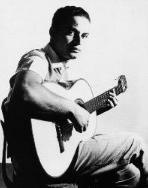
Baden Powell de Aquino, known professionally as Baden Powell, was a Brazilian guitarist. He combined classical techniques with popular harmony and swing. He performed in many styles, including bossa nova, samba, Brazilian jazz, Latin jazz and MPB. He performed on stage during most of his lifetime. Powell composed many pieces for guitar some of them now considered guitar standards, such as Abração em Madrid, Braziliense, Canto de Ossanha, Casa Velha, Consolação, Horizon, Imagem, Lotus, Samba, Samba Triste, Simplesmente, Tristeza e Solidão, and Samba da Benção. He released Os Afro-sambas, a watershed album in MPB, with Vinicius de Moraes in 1966. He's widely regarded as one of the greatest brazilian guitar players of all time.

Getz/Gilberto is an album by American saxophonist Stan Getz and Brazilian guitarist João Gilberto, featuring pianist and composer Antônio Carlos Jobim, who also composed many of the tracks. It was released in March 1964 by Verve Records. The album features the vocals of Astrud Gilberto on two tracks, "Garota de Ipanema" and "Corcovado". The artwork was done by artist Olga Albizu. Getz/Gilberto is a jazz and bossa nova album and includes tracks such as "Desafinado", "Corcovado", and "Garota de Ipanema". The last received a Grammy Award for Record of the Year and started Astrud Gilberto's career. "Doralice" and "Para Machucar Meu Coração" strengthened Gilberto's and Jobim's respect for the tradition of pre-bossa nova samba.

The Composer of Desafinado, Plays is the first album by Antônio Carlos Jobim. Released in 1963, the album features a dozen instrumentals arranged by Claus Ogerman, whose work would mark the beginning of a lifelong musical relationship with Jobim. Of these twelve songs, nearly all of them are jazz standards. The opening track "The Girl from Ipanema" is believed to be the second most recorded song in history behind The Beatles' "Yesterday," and a recording of the song by Astrud Gilberto and Stan Getz became a worldwide hit in 1964.
"Samba de uma Nota Só", known in English as "One Note Samba", is a bossa nova and jazz standard song composed by Antônio Carlos Jobim with Portuguese lyrics by Newton Mendonça. The English lyrics were written by Jon Hendricks. It was first recorded by João Gilberto in 1960 for his album O Amor, o Sorriso e a Flor.

Cannonball's Bossa Nova is a 1962 album by jazz musician Julian "Cannonball" Adderley. First released on Riverside in 1963, the album was reissued on Capitol Records several times with different covers and titles.
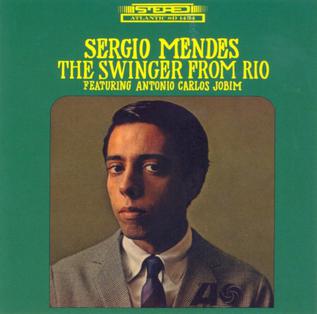
The Swinger from Rio is a 1966 album by Sérgio Mendes. Recorded over three days in December 1964 for the Atlantic label, it features guest artists Phil Woods, Art Farmer, and Hubert Laws, plus Antônio Carlos Jobim on rhythm guitar. It has also been released under the title Bossa Nova York.

Jazz Samba Encore! is a bossa nova album by Stan Getz and Luiz Bonfá, released on the Verve label. It is bossa nova in a slower groove. It contains a mix of Jobim standards as well as originals from Bonfá. Performers also include Antonio Carlos Jobim and vocalist Maria Toledo, Bonfá's wife. The painting on the cover is a piece by the influential New York based abstract expressionist Olga Albizu from Puerto Rico.
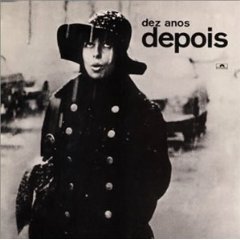
Dez Anos Depois is a 1971 double album of bossa nova standards by Brazilian singer Nara Leão.
In the late 1960s, Latin jazz, combining rhythms from African and Latin American countries, often played on instruments such as conga, timbale, güiro, and claves, with jazz and classical harmonies played on typical jazz instruments broke through. There are two main varieties: Afro-Cuban jazz was played in the US right after the bebop period, while Brazilian jazz became more popular in the 1960s. Afro-Cuban jazz began as a movement in the mid-1950s as bebop musicians such as Dizzy Gillespie and Billy Taylor started Afro-Cuban bands influenced by such Cuban and Puerto Rican musicians as Xavier Cugat, Tito Puente, and Arturo Sandoval. Brazilian jazz such as bossa nova is derived from samba, with influences from jazz and other 20th-century classical and popular music styles. Bossa is generally moderately paced, with melodies sung in Portuguese or English. The style was pioneered by Brazilians João Gilberto and Antônio Carlos Jobim. The related term jazz-samba describes an adaptation of bossa nova compositions to the jazz idiom by American performers such as Stan Getz and Charlie Byrd.

Jazz 'n' Samba is an album by American jazz vibraphonist Milt Jackson featuring performances recorded in 1964 for the Impulse! label.
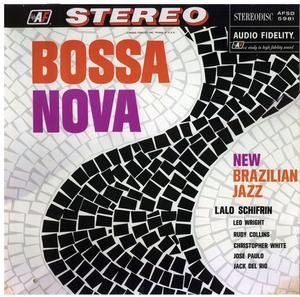
Bossa Nova: New Brazilian Jazz is an album by Argentine composer, pianist and conductor Lalo Schifrin recorded in 1962 and released on the Audio Fidelity label. The album was released during the height of the popularity of bossa nova music in the early 1960s and was one of Schifrin's earliest solo albums after leaving Dizzy Gillespie's band.

Sambalanço Trio is the debut album by Brazilian samba-jazz group Sambalanço Trio, released in 1964. The album was reissued later that year as Samblues.
This is a list of published recordings of Antônio Carlos Jobim.

Herbie Mann Live at Newport is a live album by American jazz flautist Herbie Mann recorded at the Newport Jazz Festival in 1963 for the Atlantic label.

Latin Fever is an album by American jazz flautist Herbie Mann recorded for the Atlantic label and released in 1964. The album features tracks from the 1962 sessions that produced Do the Bossa Nova with Herbie Mann with more recent recordings.
"Once I Loved" is a bossa nova and jazz standard song composed in 1960 by Antônio Carlos Jobim, with lyrics by Vinícius de Moraes. Words in English were later added by Ray Gilbert. In a few early cases, the song was also known as, a translation into English of the original Portuguese title.
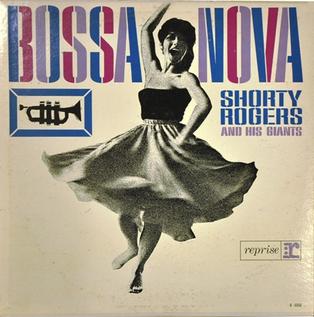
Bossa Nova is an album by American jazz trumpeter, composer and arranger Shorty Rogers, released on the Reprise label in 1962.

Inédito was a privately commissioned studio album by Antônio Carlos Jobim, released in 1987 in a limited edition to commemorate his 60th birthday, and re-released in 1995 for the general public. It was released in the United States in 2006 as The Unknown, by DRG Records.
















